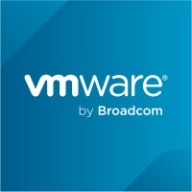

VMware Aria Operations for Logs and Cribl compete in the log management and data transformation category. Cribl seems to have the upper hand due to its capabilities in efficient data management and cost-effectiveness for high-volume data scenarios.
Features: VMware Aria Operations for Logs offers integration with the VMware ecosystem, automation, and capacity planning. It provides trace logs for troubleshooting and comprehensive dashboards. Cribl excels in data transformation and log reduction, offering real-time processing for dynamic data management and facilitating efficient data routing from diverse sources.
Room for Improvement: VMware Aria Operations for Logs can improve its user-friendliness, documentation clarity, and flexibility in log retention policies. Enhanced integrations and refined dashboards would also be beneficial. Cribl should enhance its logging and debugging features, improve the user interface's flexibility, and expand compatibility with enterprise platforms.
Ease of Deployment and Customer Service: VMware Aria Operations for Logs is mainly an on-premises solution with some hybrid cloud options and mixed customer service feedback. Cribl provides deployment on hybrid and cloud platforms with satisfactory technical support, despite some concerns about customization flexibility and versioning complexity.
Pricing and ROI: VMware Aria Operations for Logs is cost-effective within the VMware suite, though pricing for smaller customers can be steep. Cribl is viewed as cost-effective, offering good value against competitors like Splunk and scalable pricing for high-volume data management, potentially providing more significant savings.
What we've seen is really an overall reduction of just shy of 40% in our ingest into our SIM platform versus prior to having Cribl.
The second thing is that data aggregation, sampling, and reduction that we're able to do of the data, lowering our overall data volume, both traversing the network as well as what's being stored inside of our final solutions.
In terms of reduction, we were able to save almost ~40% of our total cost.
They had extensive expertise with the product and were able to facilitate everything we needed.
Usually, within an hour, we get a response, and we are able to work with them back and forth until we resolve the issues.
Sometimes by hearing the problem itself, they will know what the solution is, and they will let us know how to resolve it, and we do it immediately.
While support staff is knowledgeable, getting access to specialists can be challenging when dealing with the limits of a product.
Customer service and support have declined.
I did not need technical support because I am a professional with VMware.
The infrastructure behind Cribl Search is also scalable as it uses a CPU and just spawns horizontally more instances as it demands and requires.
Compared to other SIEM tools I use, any slight change on the operating system end impacts a lot on our SIEM tools and other things, but Cribl performs well in that regard.
It's an enterprise version, and we have a good amount of users using this solution.
Since payment is based on hardware, scalability impacts are managed more effectively than with other tools paid by data volume.
It's relatively easy to find individuals with the skills to work with VMware because it is a widely spread tool.
Migrating from those SC4S servers to Cribl worker nodes has truly been a game-changer.
Regarding scalability, we started with zero servers and have around 285 servers now.
I would rate the stability as ten out of ten.
Managing a lot of data involves reliance on hardware and network performance, which are external factors that can affect stability.
It has been very stable, and every time I needed it, it was available and working.
VMware as a whole provides very stable tools.
A more stringent role-based access control feature would enhance security and allow granular control over what users can see and access.
If we can have more internal logs and more debug logs to validate the error, that would be beneficial because instead of reaching out to Cribl support, we can troubleshoot and find the root cause ourselves.
In terms of large datasets—whether they originated from network inputs, virtual machines, or cloud instances—ingesting the data into the destination was relatively easy.
It would be beneficial to have a roadmap for these dashboards to ensure consistent functionality.
There is also dissatisfaction with Broadcom's broader attitude, which is prompting me to search for alternatives.
VMware Aria Operations for Logs is not a cost-effective tool.
Over time, the licensing cost has increased.
Cribl is very inexpensive, with enterprise pricing around 30 cents per GB, which is really decent.
They have a universal license that allows us to consume the portions of Cribl that we want to use or flex into other portions of Cribl.
Splunk, often paid by the terabytes, becomes expensive quickly if not managed carefully.
The price has risen significantly, and for smaller customers, the cost can be up to ten times more than before.
VMware comes with a lot of packages, however, it remains too expensive.
The data reduction and preprocessing capabilities make Cribl really unique.
Cribl has a feature called JSON Unroll or Unroll function that allows you to differentiate the events; each event will come ingested as a single log instead of piling it up with multiple events.
The Cribl UI is very simple and easy to use, particularly when working with data from various sources; it makes it very easy to create pipelines, add complex logic to those pipelines, and then gives you a preview of what your data looks like before applying that pipeline and what you get after.
This tool also provides greater insight when integrated with VMware infrastructure, making it more precise than other tools.
The most valuable features are log centralization and long-term retention for logs.
A valuable feature of VMware Aria Operations for Logs is its ability to allow personalization of dashboards and requests.
| Product | Market Share (%) |
|---|---|
| Cribl | 2.6% |
| VMware Aria Operations for Logs | 1.5% |
| Other | 95.9% |

| Company Size | Count |
|---|---|
| Small Business | 9 |
| Midsize Enterprise | 5 |
| Large Enterprise | 18 |
| Company Size | Count |
|---|---|
| Small Business | 7 |
| Midsize Enterprise | 9 |
| Large Enterprise | 12 |
Cribl offers advanced data transformation and routing with features such as data reduction, plugin configurations, and log collection within a user-friendly framework supporting various deployments, significantly reducing data volumes and costs.
Cribl is designed to streamline data management, offering real-time data transformation and efficient log management. It supports seamless SIEM migration, enabling organizations to optimize costs associated with platforms like Splunk through data trimming. The capability to handle multiple data destinations and compression eases log control. With flexibility across on-prem, cloud, or hybrid environments, Cribl provides an adaptable interface that facilitates quick data model replication. While it significantly reduces data volumes, enhancing overall efficiency, there are areas for improvement, including compatibility with legacy systems and integration with enterprise products. Organizations can enhance their operational capabilities through certification opportunities and explore added functionalities tailored towards specific industry needs.
What are Cribl's most important features?Cribl sees extensive use in industries prioritizing efficient data management and cost optimization. Organizations leverage its capabilities to connect between different data sources, including cloud environments, improving both data handling and storage efficiency. Its customization options appeal to firms needing specific industry compliance and operational enhancements.
Manage data at scale with centralized log management, deep operational visibility and intelligent analytics for troubleshooting and auditing across private, hybrid and multi-cloud environments.
We monitor all Log Management reviews to prevent fraudulent reviews and keep review quality high. We do not post reviews by company employees or direct competitors. We validate each review for authenticity via cross-reference with LinkedIn, and personal follow-up with the reviewer when necessary.